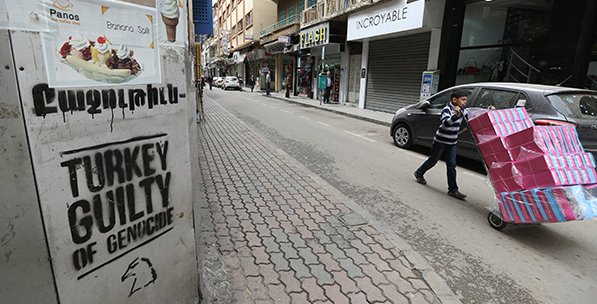Almost a year ago, in April 2014, an important breakthrough took place in the case of disputes over historical narratives between Turkey and Armenia. For the first time in the Republic of Turkey's history, then Prime Minister Recep Tayyip Erdoğan released a statement of condolence in regards to the events that took place in 1915. The statement was paving the way for a paradigm change in Turkish-Armenian relations. The spirit of this letter is still alive and the potential for reconciliation, despite all the odds, still does exist. However time is of the essence. Before it is too late, the two nations need to rescue their relationship and turn history into an element that unites them instead of one that divides.
In a week that will be occupied by the debates on historical narratives, collective memories and relations between Turkey and Armenia, it is important to remember this statement and its potential to reconcile the differences and disputes between the two countries. The statement that was released by the Prime Minister's office in April 2014, stressed important steps needed for the reparation of ties. It represented a paradigm shift in three ways. First of all, the statement highlighted the shared pain that Turks, Armenians as well as millions of other citizens experienced in the First World War. This was a new perspective from which to approach the incidents that took place at this fateful turning point of history, and provided a common ground for Turks and Armenians to rebuild their relations. In this statement, Erdoğan said, "Any conscientious, fair and humanistic approach to these issues requires an understanding of all the sufferings endured in this period, without discriminating as to religion or ethnicity. Certainly, neither constructing hierarchies of pain nor comparing and contrasting suffering carries any meaning for those who experienced this pain themselves.... It is a duty of humanity to acknowledge that Armenians remember the suffering experienced in that period, just like every other citizen of the Ottoman Empire."
A second important dimension of the letter was breaking the taboo of the Turkish politicians to avoid talking about these incidents. Instead, Erdoğan encouraged historians and researchers to debate and discuss these issues pertaining to the events of 1915 in a pluralistic and open manner. He mentioned this argument by saying that "In Turkey, expressing different opinions and thoughts freely on the events of 1915 is the requirement of a pluralistic society, as well as of a culture of democracy and modernity. Some may perceive this climate of freedom in Turkey as an opportunity to express accusatory, offensive and even provocative assertions and allegations. Even so, if this will enable us to better understand historical issues with their legal aspects and to transform resentment into friendship again, it is natural to approach different discourses with empathy and tolerance and expect a similar attitude from all sides."
Finally then, Prime Minister Erdoğan took a dramatic step forward regarding the events and extended his condolences to the grandchildren of the Armenians who lost their lives in 1915 events. Erdoğan also warned that both Armenians and Turks need to be careful about those who try to use these historical events to incite hostility and those groups who attempt to turn the issue into a political conflict.
Those who know the history of the contestation of the narratives on the 1915 events considered this statement as a potential facilitator of reconciliation between the two nations. For the last few years, the government has been taking significant steps in order to repair its ties with non-Muslim communities living in Turkey. For example, as part of a major reform process, in 2011 the Turkish government amended the Law on Foundations and expanded the property rights of these foundations around Turkey. The reform included the return of the properties of non-Muslim communities, including Armenian foundations and churches. Among those foundations whos







